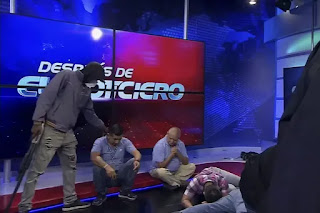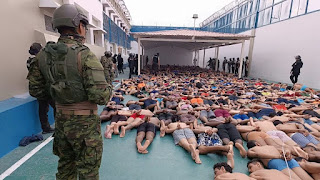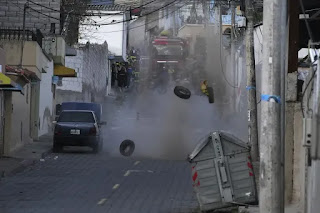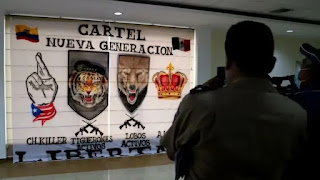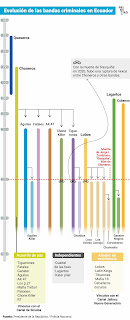.webp)
“Socalj” for Borderland Beat
President Daniel Noboa declared an internal armed conflict and classified 22 transnational organized crime groups as terrorist organizations.
“President of the Republic, Daniel Noboa, through Executive Decree 111, established a very clear mission for us: from this moment on, every terrorist group identified in the decree as mentioned has become a military objective.”
The “present and future of our country is at stake” and “no act of terror” will make them give up. “Good, justice and order cannot ask permission or bow their heads to terrorists,” he said.
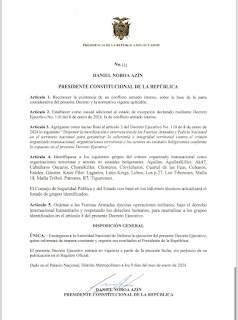 |
22 Terrorist Gangs
ÁguilasKiller
AK47
Caballeros Oscuros
ChoneKiller
Los Choneros
Corvicheros
Cuartel de las Feas
Cubanos
Fatale
Gánster
Kater Piler
Lagartos
Latin Kings
Los Lobos
Los p.2
Los Tiburones
Mafia 18
Mafia Trébol
Patrones
R7
Tiguerones
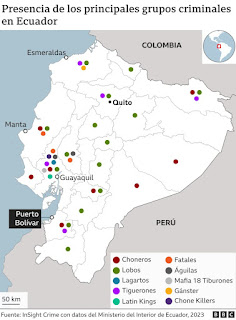 |
Since 2021, more than 400 deaths have been reported in Ecuador’s prisons due to clashes between rival gangs. The Ecuadorian prison gangs are said to generate over $120 million per year in profits from the illicit businesses and drug trafficking controlled from prisons.
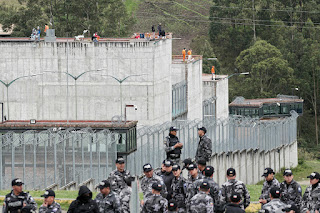 |
The convicts are in control. Not only do they run the 15 units inside the prison compound, but they also control the drug trafficking and organized crime activities that take place on the outside. It is they who decide who gets to come in and who doesn’t. They even have the keys to their own cells.
The homicide rate per 100,000 inhabitants has increased more than 300% in the last seven years and several high-profile politicians and candidates have been murdered, as was the case of Fernando Villavicencio in August of last year before the elections.
President Noboa’s security plan includes a new intelligence unit, tactical weapons for law enforcement and security, and a plan to temporarily hold dangerous prisoners on prison ships. He has proposed a referendum that is pending approval by the authorities and with which he seeks citizen support to take tougher measures.
TV Takeover
An armed takeover by gang members of the TC Television news station in Guayaquil ended with the arrest of at least thirteen and the release of the channel’s staff.
Around 2:00PM, over a dozen gunmen, many wearing masks and hoodies to conceal their identity in front of the television cameras took over the station as they were broadcasting live.
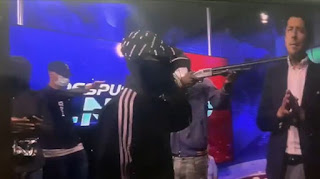 |
They pointed guns at journalist José Luis Calderón’s head and then placed a stick of dynamite in the pocket of his suit jacket.
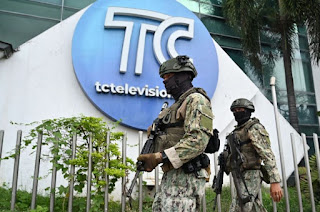 |
“We intervened, first setting up an external perimeter, we removed all the workers from the television station, and then the tactical units entered,” explained the general commander of the Ecuadorian Police César Zapata.
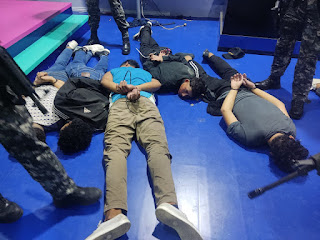 |
At the moment, the authorities believe that the detainees could be linked to the group “Los Tiguerones”. Firearms, grenades, explosive material, and two vehicles were seized.
Attacks in Ecuador
In addition to the attack on the television station, at least seven police officers were kidnapped in various regions of the country.
Explosions were also reported in Esmeraldas, Los Ríos, Loja, and Machala. Authorities are investigating an explosion in the Mayor’s office of Cuenca and another in Guayaquil.
So far, no group has claimed responsibility for the explosions. The Guayaquil police reported that 8 people died in different events in that city, which recorded 29 incidents related to armed criminals, according to the local press.
“We strongly condemn the recent criminal attacks by armed groups in Ecuador against private, public & government institutions,” White House National Security Council Advisor Jake Sullivan said in a statement on social media. “We are committed to supporting Ecuadorians’ security & prosperity & bolstering cooperation w/partners to ensure the perpetrators are brought to justice.”
Brian Nichols, the top US diplomat for Latin America, said Washington was “extremely concerned” by the violence and kidnappings, and pledged to provide assistance and to “remain in close contact” with Noboa’s team.
EU foreign policy chief Josep Borrell described the gang activity as a “direct attack on democracy and the rule of law”.
Peru put its border with Ecuador under a state of emergency. China’s embassy and consulates in Ecuador announced on Wednesday that services to the public were suspended. The US, France, and Russia all advised their citizens against travel to Ecuador.
Another video showed the guards on the floor, with knives and guns to their heads, forced to repeat the same message, that the government should reverse its decision to transfer prisoners.
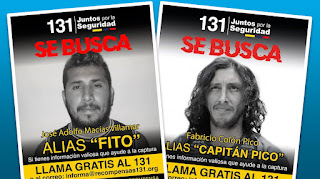 |
Los Lobos Leader Escapes
In Riobamba, more than 30 inmates escaped from prison, among whom was Fabricio Colón Pico, the leader of the Los Lobos gang, accused a few days ago of planning the murder of Attorney General Diana Salazar. The US Embassy, as part of the Recompensas131 program that offered $5 Million for information on those responsible for the presidential candidate’s assassination also announced rewards for information leading to the captures of the two escaped gang leaders.
Los Lobos are rivals of Los Choneros following a split in 2016 and ally themselves in coordination with the CJNG. They are considered the second largest gang in the country, as it is suspected to have around 8,000 members and has also participated in several of the prison riots that in 2022 left more than 400 dead.
Together with the Chone Killers and Los Tiguerones, Los Lobos have formed another organization called Nueva Generación, which would have carried out several attacks against leaders and territories controlled by Los Choneros.
Los Choneros became the dominant Ecuadorian gang in 2005 after a battle with the original gang of Ecuador, the Queseros who were founded in 1985.
Although the facilitation of drug trafficking and extortion from prisons are their main activities, in recent years they have found another source of income in the illegal extraction of gold. Thus, the local press claims that they charge a 10% tax on miners who operate illegally in areas such as the jungle province of Imbabura, in the north of the country.
They are also linked to the 48th Front, a dissident group of the demobilized Revolutionary Armed Forces of Colombia (FARC).



